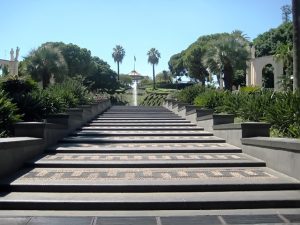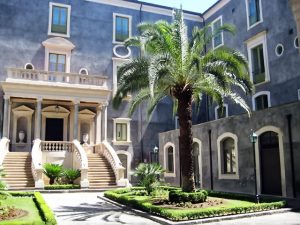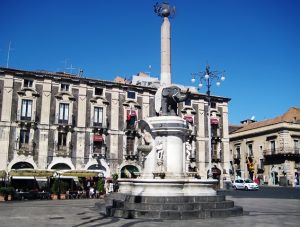- University of Catania
- City of Catania
- Degrees Taught in English
- Accommodation and Transportation
- Photo Gallery
The University of Catania, was first established in 1434 with only 4 majors. And until this day it hosts around 50,000 students in 42 undergraduate degrees, 16 master degrees and 18 PhD degrees. It’s one of the oldest and biggest in south-center of Italy and it improves its quality in the field of research and internationalization day by day. For the latter, the university offers more English language courses each semester and enlarges the agreements with other countries in education (with Payame noor University of Tehran and Tabriz University in Iran, for instance).
The grading system is on the basis of A to FX. There are two semesters (Sep/Oct) and (Jan/Feb) and the enrolment procedure is a bit different for Italian Students, EU Student and non-EU students. There are many English language courses in all levels for which you can consult us, or download the English catalogue of the university where all the things are explained thoroughly.
The city of Catania is the Capital of the province Catania in South Italy on the coast of Sicily facing to Ionian sea and is the tenth largest city in Italy. The city has been destroyed during years by catastrophic earthquakes and Volcanic eruptions of mount Etna. Never the less, it has been a city founded in 8th century BC and had been flourished year by year ever since specially during Renaissance it was an influential and important city. The total area of the city is around 180 km ² in which reside a population of 316000 persons (according to 2013 stats). There are many historical sites in Catania as are in almost all other ancient cities in Italy, including the classical buildings, Roman thermal structures, baroque and historical churches, etc. the economy of the city is based on petrochemical industries and extraction of sulphure and the rapid economic growth made it to be called “Milan of the south”. The twin towns of Catania are Phynix, U.S. and Ottawa, Ontario, Canada as well as Grenoble, France and Oswiecim, Poland. Catania has also been the basis of planning the city Adelide, Australia as the servoyer The city enjoys a sub Mediterranean climate with average temperature of at least 11 C to at most 25 C throughout the year.
Master’s Degree in Humanities
Number of Credits: 120
English language requirement: B1
Admission Requirements: Have earned an undergraduate degree in a three-year Bachelor course in the area of Social and Human Studies.
Application Deadline: June 1
Course Description:
It is a two-year full-time programme entirely taught in English. It offers an advanced training program to people eager to analyze how European and global institutions tackle the challenges set by the recent acceleration of the process of globalization, and the increased interdependence of societies, markets, and states; to sharpen their analytical and critical reasoning, and to approach world politics from a genuinely multidisciplinary perspective. GLOPEM innovative feature is the association of global politics, European governance, and Euro-Mediterranean relations. Focus is on global institutions, policies and issues, global justice, EU policy-making and governance, and key Mediterranean issues. GLOPEM offers also the Double Degree Programme with the University of Liège.
Number of Credits: 120
English language requirement: B1
Admission Requirements: Have earned an undergraduate degree in a three-year Bachelor course in the area of IT, Electrical Engineering, Power Engineering, Industrial Engineering
Application Deadline: June 1
Course Description:
The Master of Science in Electrical Engineering has as main objective to train professionals of high profile able to face all the typical problems of design that are encountered in the production, distribution and utilization of electricity.
Particular attention is paid to the diversification of primary energy sources, the problem of conversion and that of the control. Who expect the Master of Science in Electrical Engineering will be able to:
-formulating mathematical models of components and / or processes for the production, transfer and use of electrical energy.
-analyze complex problems in engineering of electrical systems and formulate innovative solutions.
-prepare projects electrical installations in industrial and civil making use of methods of automation.
-design and use machines and electrical drives.
-design and supervise the realization of systems for the production of electricity from both conventional and alternative sources.
-be able to work as a team in order to design systems that require a multidisciplinary approach.
Number of Credits: 120
English language requirement: B1
Admission Requirements: Have earned an undergraduate degree in a three-year Bachelor course in the area of Chemistry, Environment, Civil, Industrial Engineering
Application Deadline: June 1
Course Description:
The Chemical engineering for sustainability aims to combine the research and technological development through the application of chemistry.
This is an interdisciplinary course of studies that unifies chemical, physical and mechanical engineering as well as environmental and management aspects. In particular this course is the branch of engineering that deals with the design, construction and management of devices and systems. That arise by chemical reactions studied in research laboratories. In order to solve practical problems and/or give rise to useful products.
Number of Credits: 120
English language requirement: B1
Admission Requirements: Have earned an undergraduate degree in a three-year Bachelor course in the area of IT,Electronics, Industrial Engineering
Application Deadline: June1
Course Description:
The Master Degree Course In Automation Engineering and Control of Complex Systems aims to provide students a deep knowledge of the fundamentals of technical as well as scientific aspects of the disciplines which characterize the field of Automation Engineering, without discarding affine and integrative subjects. The Course is focussed at forming a high knowledge in students, enabling them to easily follow technological innovation in the industries as well as in public and/or private research institutes. The Course In Automation Engineering and Control of Complex Systems will be able to provide both a suitable design ability devoted to the development of traditional techniques and a capability to face with novel problems in emergent scenarios.
The Automation Engineer will find an easily working configuration in Enterprises dealing with automated plant and Robotic assisted production sites, as well as in those industries which develop highly technological products which integrate software components, measurement, transmission and actuation systems.
Primary goals of the Course are to provide a highly flexible knowledge which allow to easily adapt among multiple application working sectors where Automation is involved as a result of the technological development and the new working conditions. Analysis and Design capabilities, based on the use of the modern tools are the basic features provided by the Course.
The University of is located in an important city where you will never worry about how to get there or how to commute inside the city. There are direct flights from anywhere to the city’s international airport. Also there are busses from Milan, and even ship traveling. The city has had subway system since 1999.
There are also reliable websites students can consult for renting rooms/apartments via the university website. Normally like other important big Italian Cities, the renting prices in different areas of the city arre different and range between 150 Euros (for a single room with shared toilet and bathroom) to more than 500 Euros (for a single room apartment).


